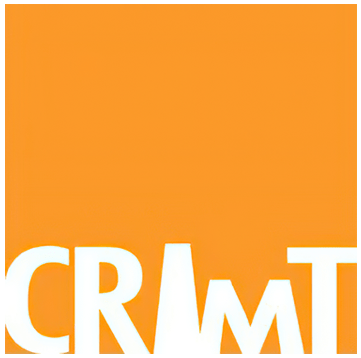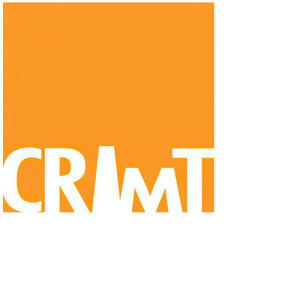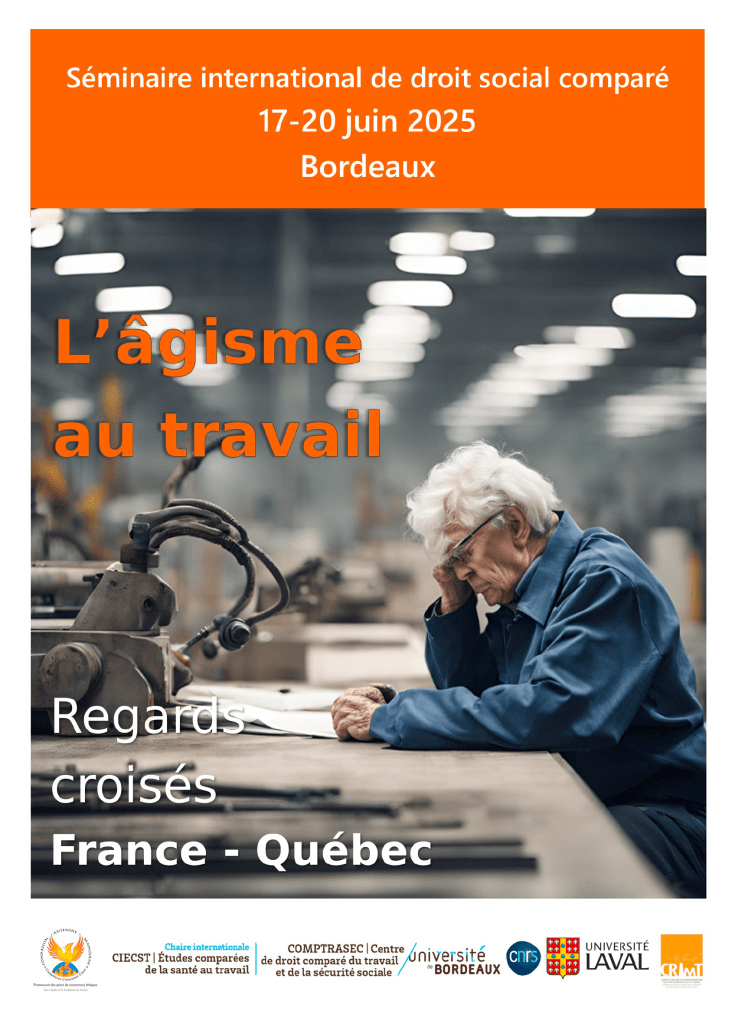
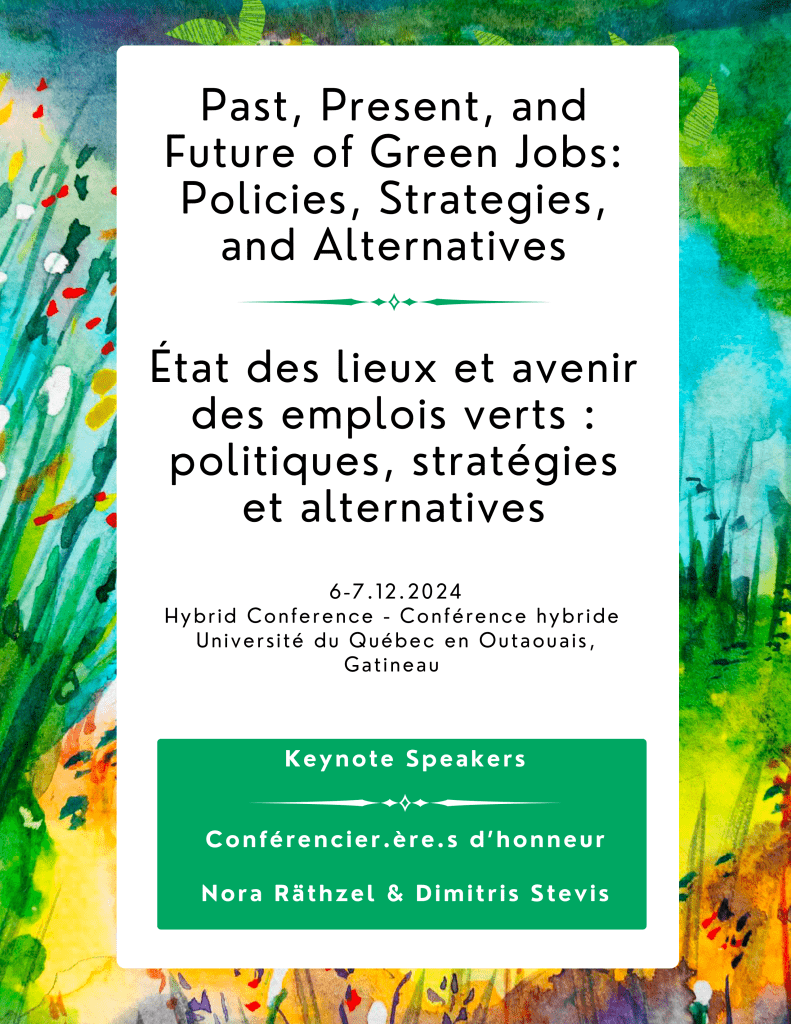
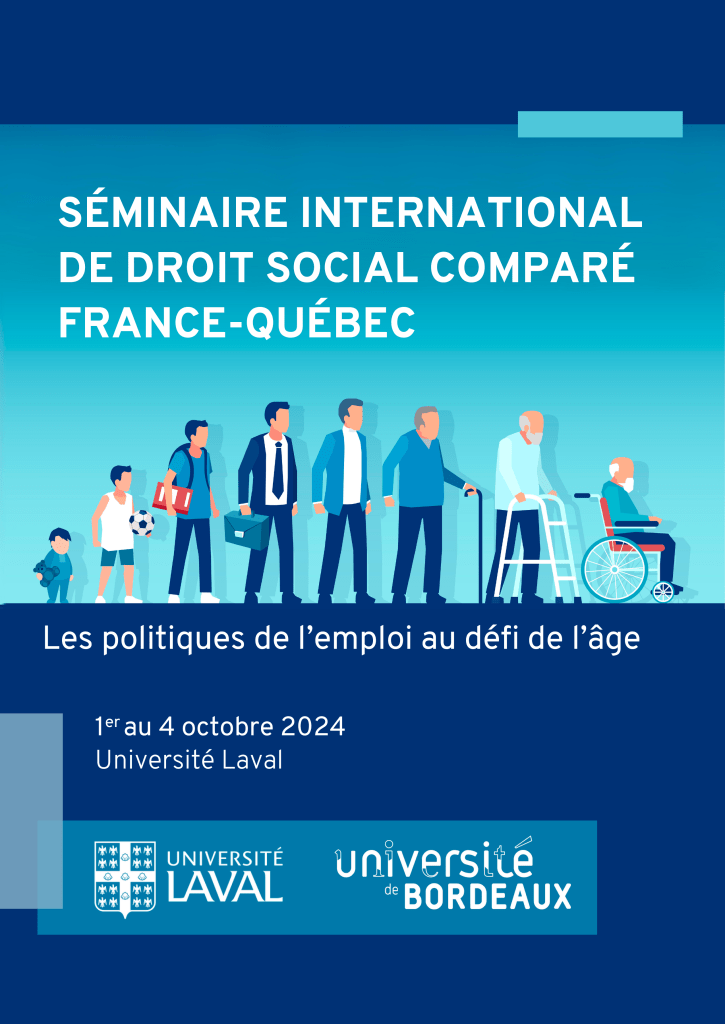
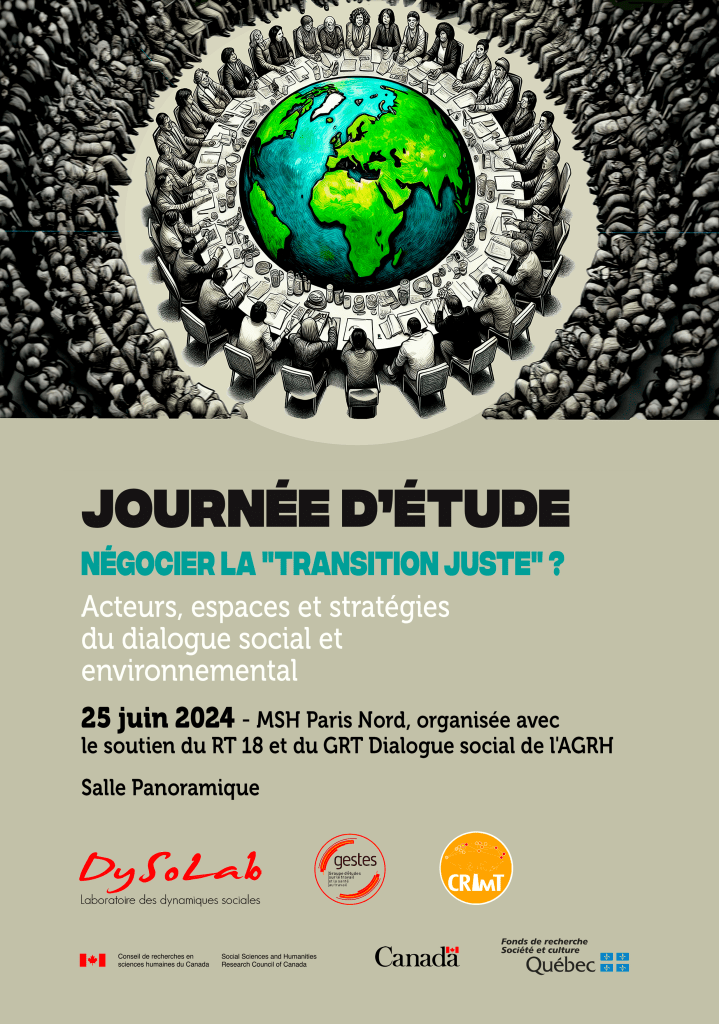
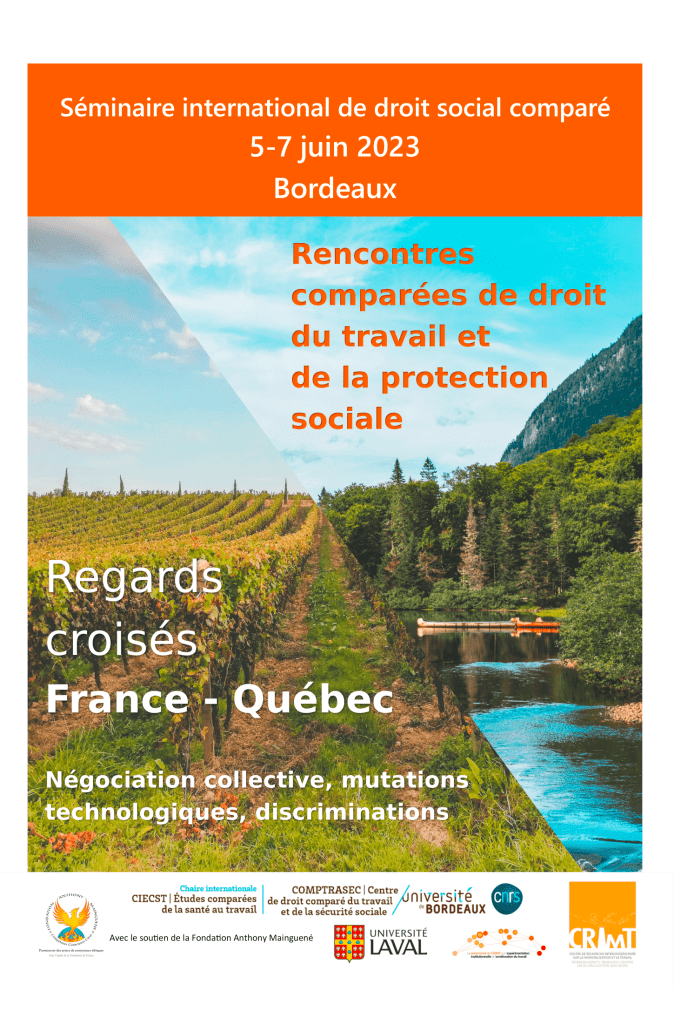
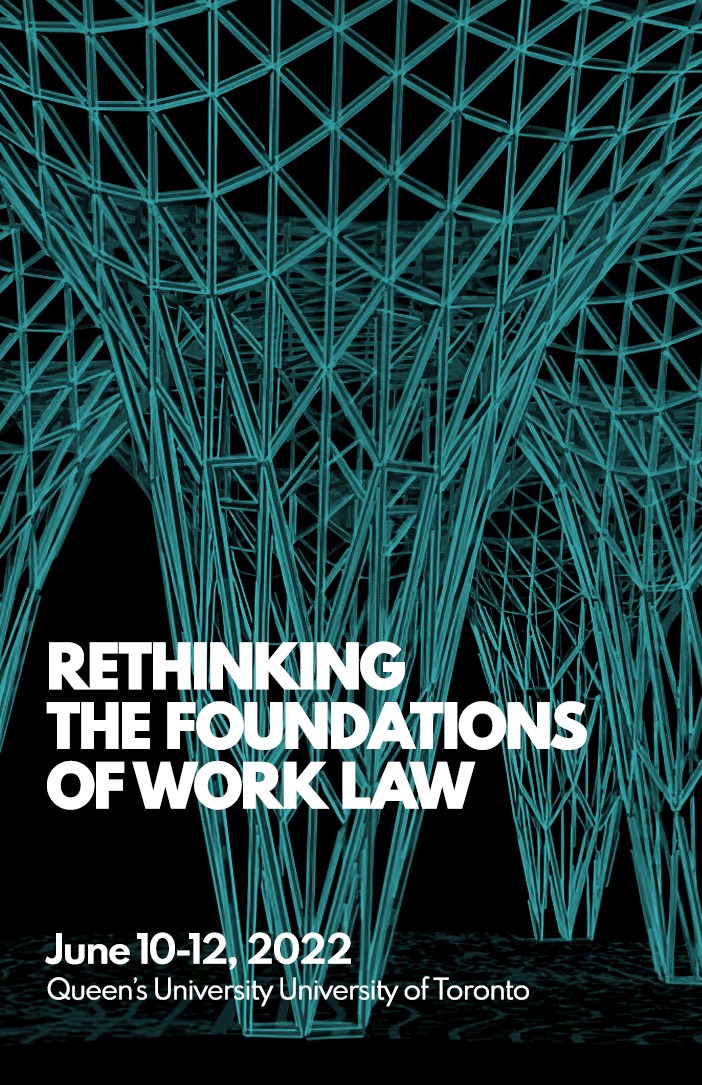
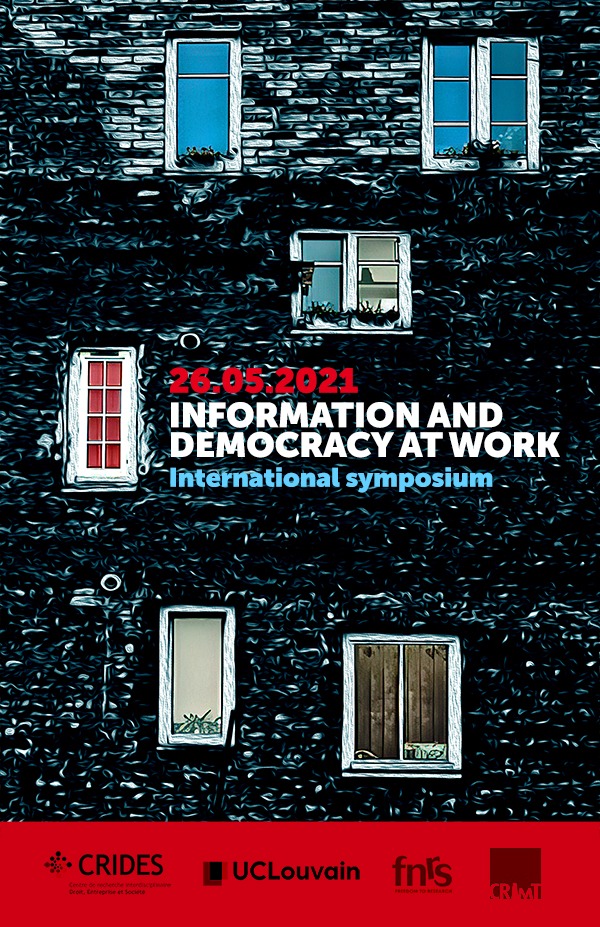
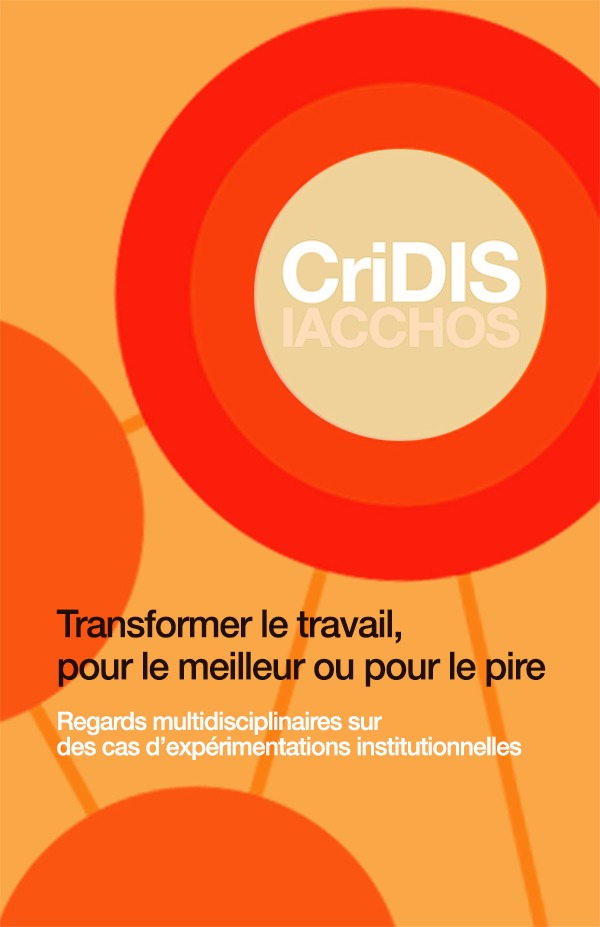
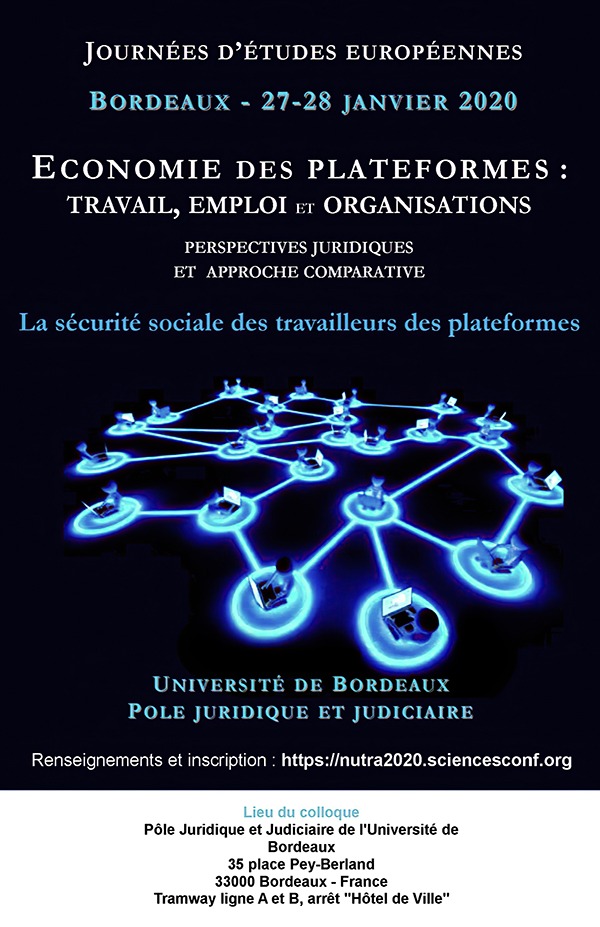
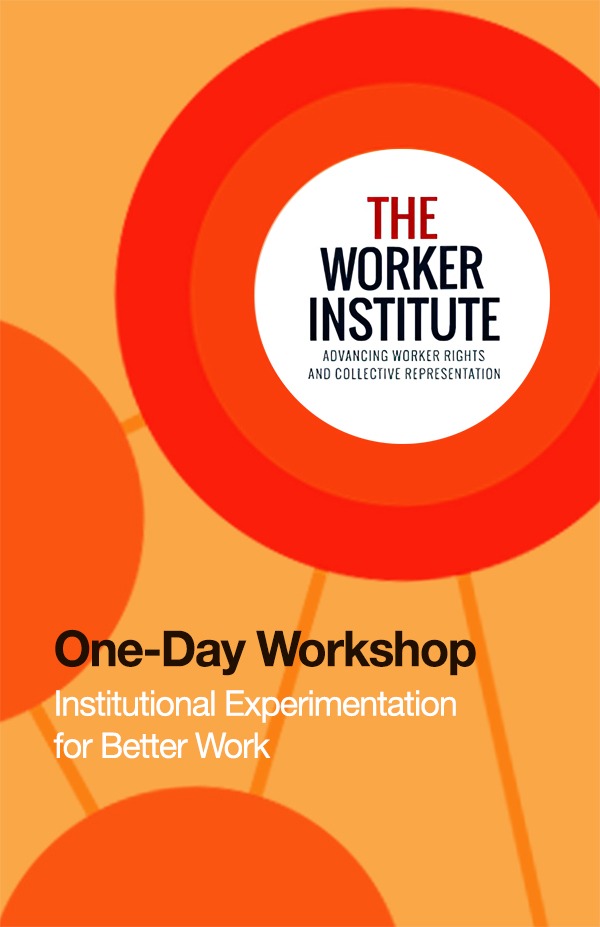
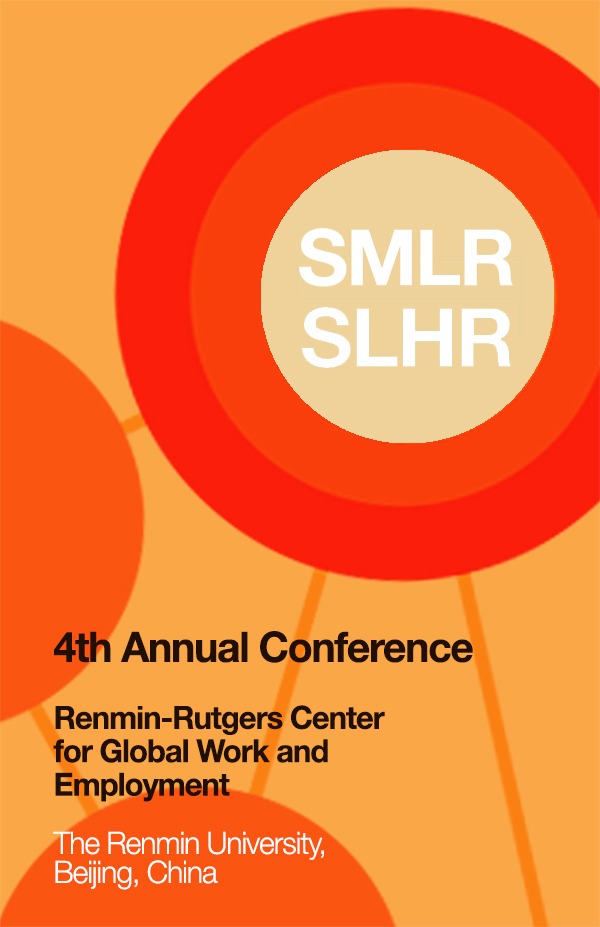

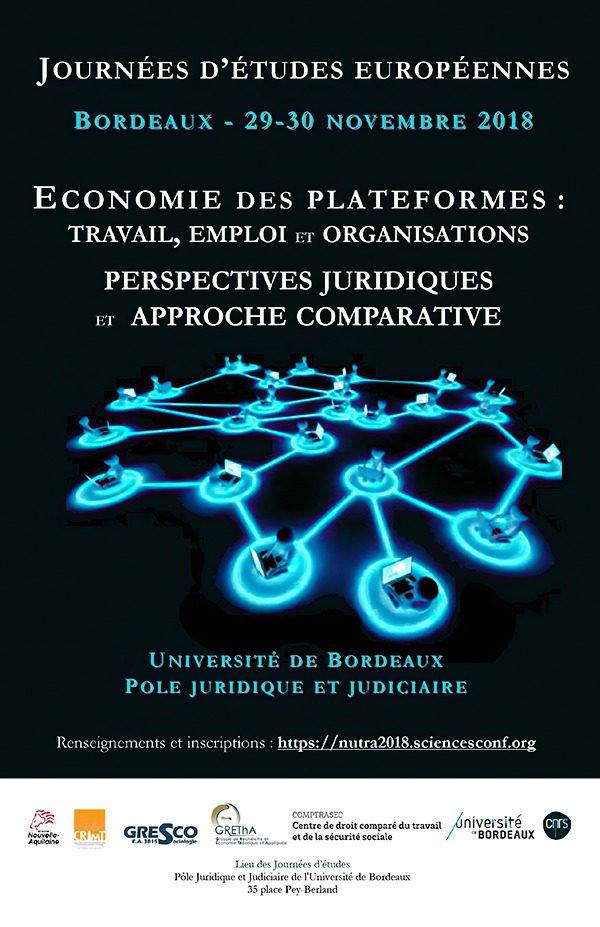
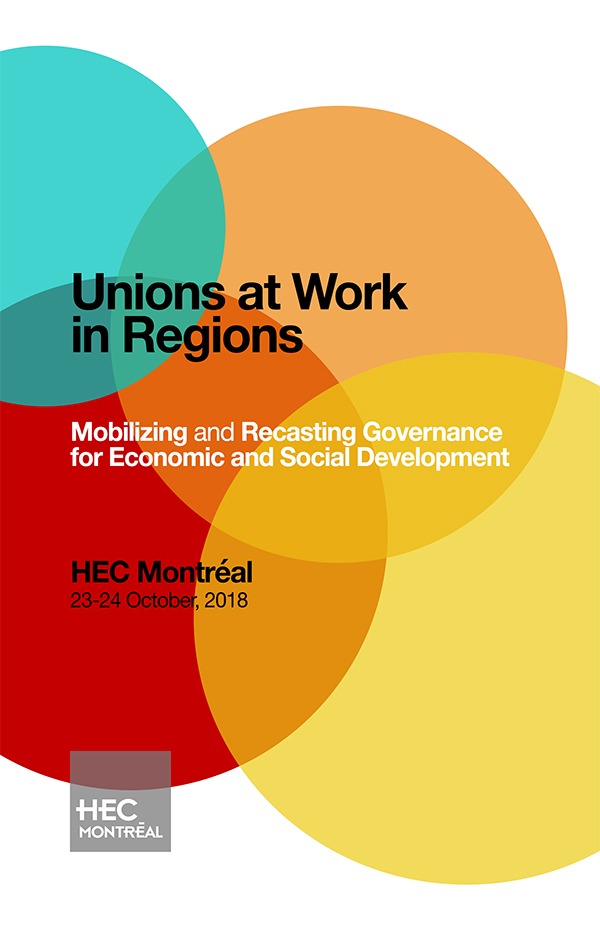
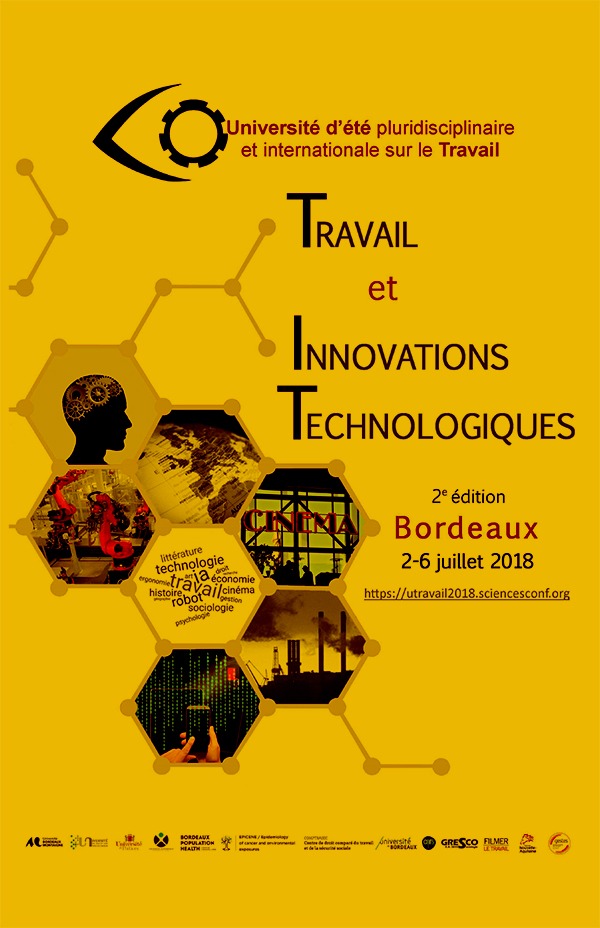
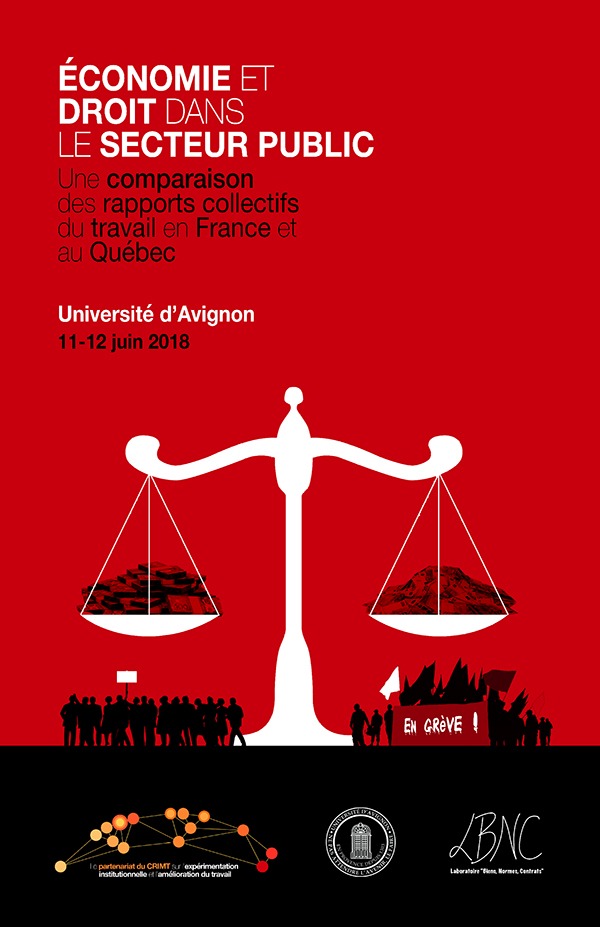

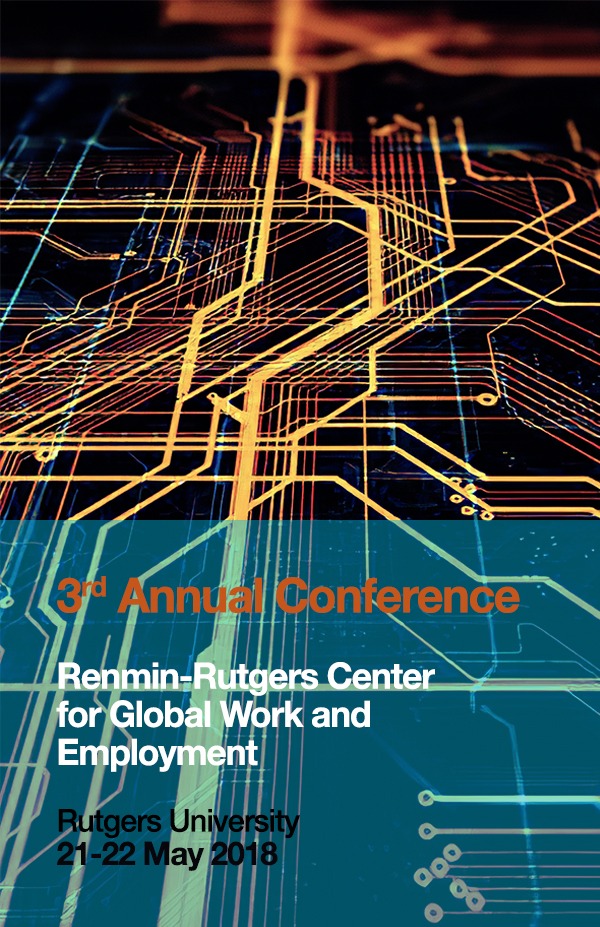
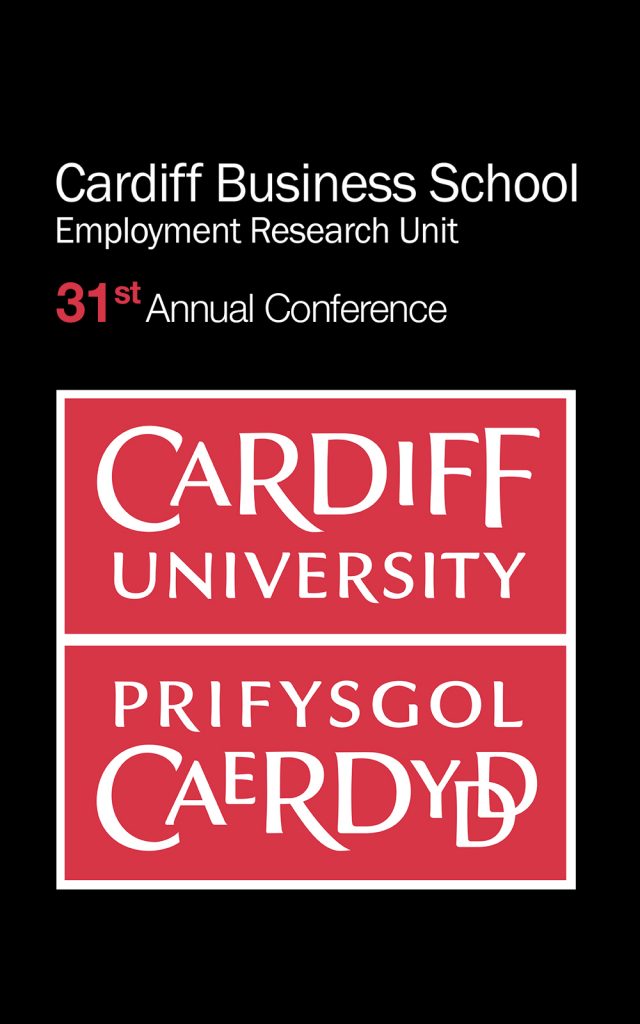
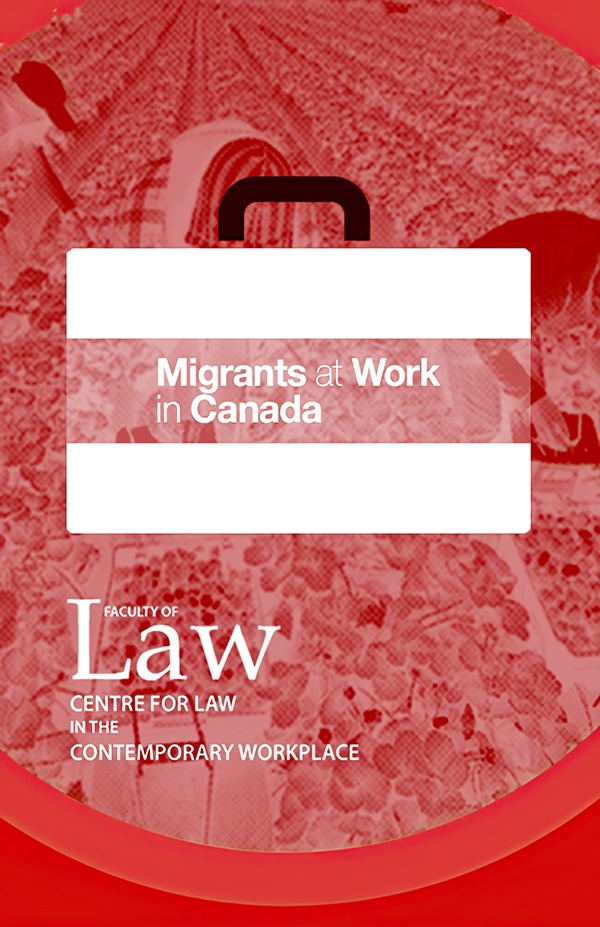
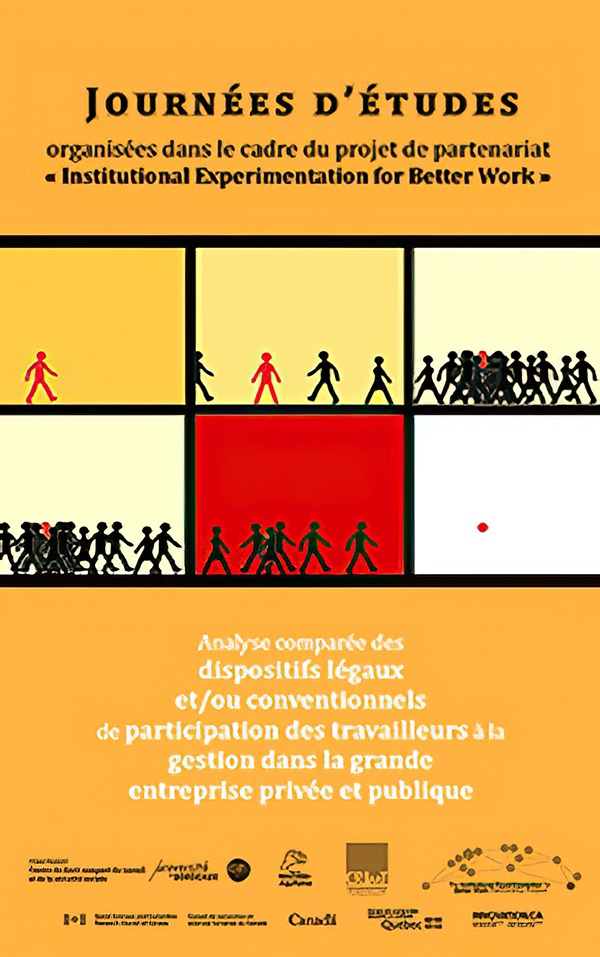

17-20 June 2025
International symposium
Université de Bordeaux, France
Age discrimination at work
A collaboration between the Interuniversity Centre on Globalization and Work (CRIMT) and the Centre de droit comparé du travail et de la sécurité sociale (COMPTRASEC) led the University of Bordeaux to host the third edition of the International Seminar on Comparative Social Law in June 2025.
This annual event, alternating between Laval University and the University of Bordeaux, brought together researchers from various fields to discuss comparative issues related to work and employment. It also provided a valuable opportunity for graduate students to explore and analyze these topics from an international perspective.
Focusing on the theme of “Age discrimination at work,” this third edition built upon discussions initiated during the second edition at Laval University in 2024. Age, more than just a number, proved to significantly influence working conditions, career paths, occupational health, and the adaptation of work environments to meet individual needs. It also raised issues related to discrimination, legal disputes in labor matters, and the unique characteristics of unionized workplaces.

6-7 December 2024
International symposium
Université du Québec en Outaouais
Past, Present, and Future of Green Jobs: Policies, Strategies, and Alternatives
The international bilingual hybrid symposium titled: Past, Present, and Future of Green Jobs: Policies, Strategies, and Alternatives brought together a significant group of researchers and practitioners to thoroughly examine the evolution of so-called “green” jobs.
Over the course of two days, participants delved into a variety of topics, including the impact of economic and environmental policies on these professions, the changing working conditions within certain ecological sectors, and the analysis of transition strategies implemented for fossil fuel industries and those facing decarbonization challenges.
Discussions also focused on different approaches to a just transition, the issues raised by “green” extractivism in the Global South, as well as the prevailing economic models in ecological sectors and the union strategies adopted in response to environmental challenges.
Finally, speakers encouraged a deep reflection on the very nature of work viewed through an ecological lens. Keynote speakers included Nora Räthzel, Dimitris Stevis, Thea Riofrancos, and Matt Huber. The event took place on December 6 and 7, 2024.

1-4 October 2024
International symposium
Université Laval / Université de Bordeaux
Employment Policies Facing the Challenge of Age
Under the auspices of The Interuniversity Research Centre on Globalization and Work (CRIMT), the Centre de droit comparé du travail et de la sécurité sociale (COMPTRASEC), the Chaire de recherche Antoine-Turmel sur la protection juridique des aînés, and the Chaire internationale d’études comparées de la santé au travail (CIECST), Université Laval hosted the second edition of the International Comparative Labour Law Seminar in October 2024.
Organized alternately between Université Laval and Université de Bordeaux, this biennial seminar brings together researchers from diverse backgrounds to discuss comparative themes related to work and employment while offering graduate students an opportunity to engage in comparative analysis.
The theme of this second edition was Employment Policies Facing the Challenge of Age. Age can influence or act as a determining factor in various aspects, including working conditions and career paths, occupational health and the adaptation of work to individuals, anti-discrimination efforts, labour law litigation, and issues specific to unionized workplaces.

25 June 2024
Study Day
MSH Paris Nord
Negotiating the “just transition”. Stakeholders, arenas, and strategies for social and environmental dialogue
The international bilingual hybrid symposium titled: Past, Present, and Future of Green Jobs: Policies, Strategies, and Alternatives brought together a significant group of researchers and practitioners to thoroughly examine the evolution of so-called “green” jobs.
Over the course of two days, participants delved into a variety of topics, including the impact of economic and environmental policies on these professions, the changing working conditions within certain ecological sectors, and the analysis of transition strategies implemented for fossil fuel industries and those facing decarbonization challenges.
Discussions also focused on different approaches to a just transition, the issues raised by “green” extractivism in the Global South, as well as the prevailing economic models in ecological sectors and the union strategies adopted in response to environmental challenges.
Finally, speakers encouraged a deep reflection on the very nature of work viewed through an ecological lens. Keynote speakers included Nora Räthzel, Dimitris Stevis, Thea Riofrancos, and Matt Huber. The event took place on December 6 and 7, 2024.

5-7 June 2023
International symposium
Université de Bordeaux / Université Laval
Collective bargaining, technological changes, discrimination
Under the auspices of the Interuniversity Research Centre on Globalization and Work (CRIMT), the Centre de droit comparé du travail et de la sécurité sociale (COMPTRASEC), the Chaire internationale d’études comparées de la santé au travail (CIECST), with the support of the Anthony Mainguené Foundation, the University of Bordeaux hosted the inaugural edition of the International Seminar on Comparative Social Law in June 2023.
This annual seminar, alternating between Laval University and the University of Bordeaux, brings together researchers from various fields to discuss comparative themes related to work and employment, while providing graduate students with an opportunity for comparative analysis.
The focus of this first edition was on “collective bargaining, technological changes, and discrimination.” The seminar facilitated discussions on the comparison of legal systems, the implications of the issues raised in both Quebec and France, and the experiments conducted by experts in the field.
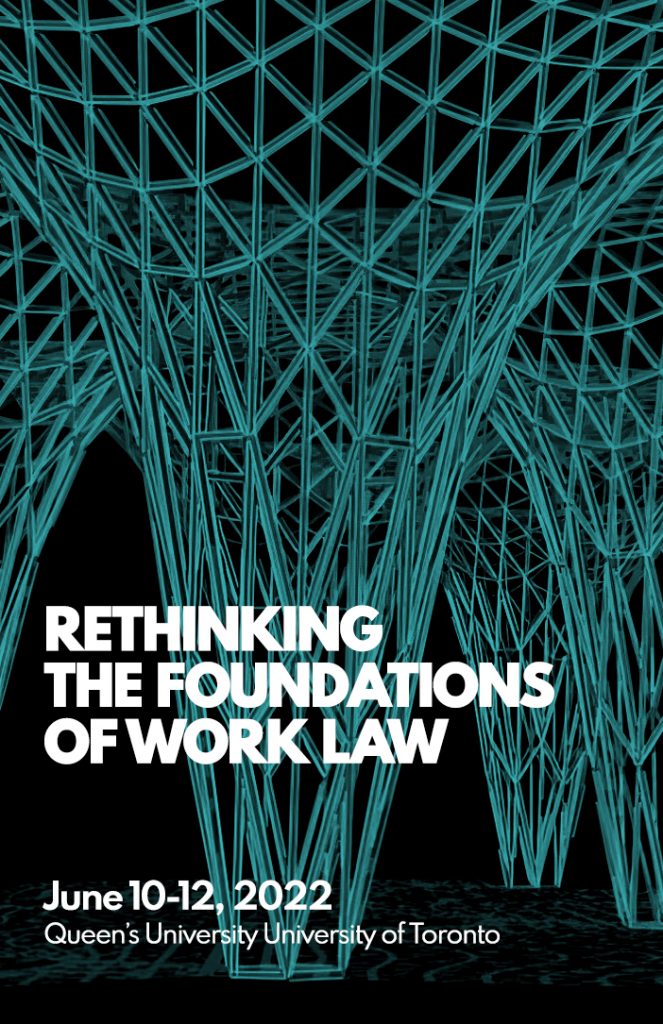
10-12 June 2022
International Symposium
Queen’s University / University of Toronto
Rethinking the Foundations of Work Law. A Sustained Initial Inquiry in Two Connected Workshops
Taken together, the growth and concentration of labour market risk of workers, declining access to representation and voice, pressures on control over time, rising income inequality and declining social mobility, and persistent levels of non-compliance within a context of increasing competitive pressure on employers pose fundamental challenges for workplace law and policy in Canada, as in many other industrialized states. They call into question its capacity to achieve the understood goals of dignity, access to justice, and equitable distributions of income and opportunity for social mobility. They deepen the inequalities faced by historically disadvantaged groups. They raise basic questions about whether foundational structures of law and policy that are anchored in workplaces remain fit for purpose, and whether better alternatives are possible.
To begin to answer such questions, it is necessary to be clear about what purposes matter today, and what specific challenges and opportunities economic and technological change pose for them.
This set of two workshops will brought together legal scholars, social scientists and philosophers to identify and examine how those changes stand to affect workers and employers, and what this means for workplace policy and law.
This was done on the basis of a focused examination of available and new information. While the focus of enquiry was on Canada, the Canadian experience is similar to that of other industrialized countries and interconnected with that of states and economies around the world. Comparative analysis made an important contribution. The goal was to “go deep” – to think hard about the purposes of work law and policy and to identify specific implications of economic and technological change for the reach and capacity of law to pursue fundamental goals. From there we asked whether the foundational structures of work law and policy in Canada – the employment relationship, the common law contract of employment or employer/ workplace-level collective agreement, and a floor of basic legislated standards – can meet those goals, or whether they need to be recast.
This workshop was a contribution by the Queen’s Centre for Law in the Contemporary Workplace to the CRIMT Partnership on Institutional Experimentation for Better Work.

26 May 2021
International Symposium
UCLouvain, Belgium
Information and Democracy at Work
This international symposium provided for a comparative study of four legal instruments promoting information and democracy at work, both in terms of their effectivity and potential contribution to a new paradigm of corporate governance. Information circulation and knowledge sharing are the common grounds for all four frameworks, which, despite their divergent backgrounds, aim for a more democratic corporate apparatus.
This symposium was organized by Elliot Cobbaut and Fotios Bregiannis (UCLouvain) under the auspices of the CRIDES and CRIMT’s Institutional Experimentation for Better Work Partnership Project. It was funded by the Fond National de la Recherche Scientifique (FNRS).

28 January 2020
International Seminar
UCLouvain, Belgium
Transforming Work…for Better or for Worse: Multidisciplinary Perspectives Cases of Institutional Experimentation
This seminar, initiated by the TED-CriDIS-UCLouvain and the LaboRH Chair (LouRIM-CIRTES) and bringing together researchers from Louvain and abroad, aimed to discuss and put into practice the method developed by the CRIMT partnership collective to study transformations in the world of work in a comparative and critical perspective.

27-28 January 2020
European Study Days
Université de Bordeaux, France
The Platform Economy: Work, Employment and Organizations. Legal Perspectives and Comparative Approach. Social Security of Platform Workers
Organized by the COMPTRASEC in collaboration with its partners, this study day (2nd in a series) aimed to examine how work, corporate structures and market regulation evolve in sectors ‘disrupted’ by the so-called ‘sharing’ economy. Technological changes make new forms of work and new business models possible; but the viability of these transformations is itself conditioned by the law and the institutions regulating work and markets in the affected sectors.
The aim of the seminar was to study the effects of this new economy on employment and forms of work; to examine competitive dynamics and build typologies of business models of the companies involved in the selected sectors; to evaluate the transformations of labour regulations and markets and, upstream, to analyze new modes of mobilization and collective action deployed by economic and social actors.

26 June 2019
International Seminar
The Worker Institute, New York City, USA
One-Day Workshop on Institutional Experimentation for Better Work
This international seminar is part of a series of regional workshops organized as part of CRIMT’s Partnership Project on Institutional Experimentation and Better Work, of which the ILR School at Cornell University is a partner.
The objective was to highlight the ongoing projects on organizational and institutional innovation in which the ILR School’s Worker Institute is engaged and to place these projects within a broader discussion of experimentation in the re-regulation of work and employment.
The seminar included presentations in four important areas: (i) combating sexual harassment in the workplace; (ii) community economic development; (iii) workers’ rights in the platform economy; and (iv) labour and the climate crisis.

31 May – 1 June 2019
4th Annual Conference of Rutgers-Renmin Center for Global Work and Employment
The Renmin University, Beijing, China
Digital Economy and Future of Work
The SMLR‘s Center for Global Work and Employment and Renmin University’s School of Labor and Human Resources (SLHR) co-hosted their 4th annual seminar. The Director of the Center, Professor Mingwei Liu, and Weiguo Yang, Dean and Professor of the University of Remnin – both coresearchers at CRIMT – delivered welcoming addresses. Like the 2017 seminar, the 2019 seminar focused on the digital economy and the future of work.

4-5 April 2019
International Seminar
Loughborough University London, United-Kingdom
Globalizing Actors: Creating, Diffusing and Contesting the norms of International Management
Organized by the International Institute of Management at Loughborough University London, this international seminar sought to shed fresh light on those who are involved in the operation of global norms. We particularly welcome contributions that attempt to identify the diverse groups involved in the creation, dissemination, implementation and contestation of global norms within multinationals, and/or which trace specific processes of norm-making within MNCs.

29-30 November 2018
European Study Days
Université de Bordeaux, France
The Platform Economy: Work, Employment and Organizations. Legal Perspectives and Comparative Approach
Organized by the COMPTRASEC in collaboration with its partners, this study day (2nd in a series) aimed to examine how work, corporate structures and market regulation evolve in sectors ‘disrupted’ by the so-called ‘sharing’ economy. Technological changes make new forms of work and new business models possible; but the viability of these transformations is itself conditioned by the law and the institutions regulating work and markets in the affected sectors.
The aim of the seminar was to study the effects of this new economy on employment and forms of work; to examine competitive dynamics and build typologies of business models of the companies involved in the selected sectors; to evaluate the transformations of labour regulations and markets and, upstream, to analyze new modes of mobilization and collective action deployed by economic and social actors.

23-24 October 2018
International Seminar
HEC Montréal, Canada
Unions at Work in Regions : Mobilizing and Recasting Governance for Economic and Social Development
The purpose of this international seminar was to discuss the chapters of an eponymous book published under the auspices of the CRIMT Partnership Project on Institutional Experimentation and Better Work and to be published by Routledge.
![]()

2-6 July 2018
Summer Institute on Work
Université de Bordeaux, France
Work and Technological Innovations
Work is currently undergoing radical transformations with the advent of the digital economy, dematerialization, robotization, cobots, augmented humans (etc.). If, contrary to some predictions, work has not come to an end, the fact remains that the advent of digital technology, considered by some as the 3rd or even 4th revolution, is suspected of having radical effects, leading to contradictory predictions between the wonderful world of the collaborative economy and the haunting of a world without work, or better yet of crowdworkers (mechanical Turks) or even intelligent factories. The impacts are multiple and their scope uncertain on the economic, social and human levels. It is supposed to bring about a radical upheaval in the way our societies function, our lifestyles, our intimacy. In particular, it surreptitiously displaces the traditional economic models of companies and subordinate labour.
Organized by the COMPTRASEC, the Epicene team and Gresco, in collaboration with the international film festival Filmer le travail de Poitiers, CRIMT and other partners, the ambition of this Summer University on Work and Technological Innovations was to convince young researchers of the value of a multidisciplinary and comparative approach to better understand the upheavals that work is undergoing as a result of technological innovations at the beginning of the 21st century.

11-12 June 2018
International Seminar
Université d’Avignon, France
Economics and Law in the Public Sector. A Comparison of Collective Labor Relations in France and Quebec
This international seminar, jointly organized by the Laboratoire Biens, Normes, Contrats de l’Université d’Avignon and CRIMT, aimed to take a cross-sectional and comparative look at collective labour relations in France and Quebec in the public sector.

5-6 June 2018
International Seminar
Université Paris-Dauphine, France
Work and Employment in the Age of Platform Capitalism
Debates on new forms of work and employment are taking on considerable importance. For many observers and journalists, Western societies are in the process of “uberization”, a neologism derived from the name of the now famous platform for bringing private drivers and individual users together. The Uber company symbolizes the emergence of platform capitalism, which would shake up both the collective organization of work and forms of employment. Behind the Uber case lies a new economic model in which capitalist companies (in the form of digital platforms) play the role of intermediaries between customers and service providers, as well as between job seekers and job providers. Beyond the passenger transport sector, platforms have developed in multiple fields, such as home delivery (Deliveroo) or housing supply (Airbnb). Some of these new economic players have become multinational firms (Airbnb, Uber, etc.) in just a few years, posting colossal revenues, and becoming emblems of the new digital economy. This international seminar was devoted to the analysis of the new economic and work practices induced by these digital platforms.
Co-organized jointly by IRISSO, ANR, PSL, the Institut universitaire de France and CRIMT, this international seminar was an opportunity to put into perspective the results of the Capla survey (mainly conducted in France), but also to give space to a dialogue with works conducted in other countries.

21-22 May 2018
3rd Annual Conference of Rutgers-Renmin Center for Global Work and Employment
Rutgers University, USA
Point-Counterpoint: Digital Technology and Work, Working Arrangements and Workers’ Well-Being
Recent advances in digital technology, such as robotics, artificial intelligence, online platforms, and social/mobile/wearable media, have triggered polarized debates on their impacts on work, employment, labor, business, and society. Is a revolution underway or is everything old new again? Will robotics and artificial intelligence lead to mass unemployment or create more jobs? Are the emerging digital technologies fundamentally changing the nature of work and how it is managed and blurring the lines of employment? Will a growing portion of the labor force become the digital precariat or the empowered freelancer? Are traditional labor unions adapting or giving way to new forms of worker representation in the new digital era? Will digital technology transform the dynamics, patterns, and structure of organizations and the way of doing business? Is digital technology a tool of liberation that makes work easier and facilitates collective action or a tool of oppression that strengthens monitoring and surveillance and threatens privacy and dignity? How should public policies maximize opportunities from emerging digital technologies while minimizing their negative impacts? Should we focus on regulating digital technology, strengthening social protections, providing universal basic income, or developing employee or citizen ownership?
Co-organized by the SMLR‘s Center for Global Work and Employment (Rutgers University) and the School of Labor and Human Resources at Renmin University, in collaboration with CRIMT’s Institutional Experimentation for Better Work Partnership Project, this seminar sought to explore the sources of tension between the digital economy, new forms of work organization, new employment ‘contracts’ and employee well-being.

11-12 May 2018
International Seminar
Cardiff University, United-Kingdom
Global Value Chains and their Employment Relations Consequences
The 31st annual colloquium of the Employment Research Unit (ERU) at Cardiff University focused on the emergence, growth and evolution of global supply chains and the labour relations issues they raise. The re-articulation of global supply chains and workplaces is topical and explicitly mentioned in the ILO’s International Labour Program and the OECD’s concerns about skills (OECD, 2017). Although topical, much of the research in this area focuses on power relations between firms within the supply chain, while concerns about labour relations appear to be secondary. This situation is tending to change, as a growing number of publications are now focusing on the issue.

20-21 April 2018
International Seminar
Queen’s University, Canada
Migrants at Work in Canada
Organized by the Centre for Law in the Contemporary Workplace (Queen’s University), this seminar aimed to explore how to better regulate the “global labour supply chain” in light of the growing number of migrant workers in Canada. In addition, the seminar brought together a variety of new labour organizations experimenting with various forms of individual and collective representation of migrant workers.
This seminar brought together academics and migrant worker advocates with three objectives in mind. The first objective was to facilitate interaction between researchers studying migrant worker issues and advocates who work with migrant communities. We wanted the symposium to generate original theoretical, empirical, and practical research that is informed by the work of advocates on the ground. The second objective was to make this knowledge available to the broader public through the publication of academic papers and other accessible avenues. The third objective was to provide migrant worker advocates with access to cutting-edge research to inform their practice. Materials from this workshop are to be published soon.

21-22 September 2017
International Seminar
Université de Bordeaux, France
Comparative Analysis of the Legal and/or Conventional Mechanisms of Workers’ Participation in Management in Large Private and Public Companies
Organized by the COMPTRASEC, the aim of this international seminar was to compare legal provisions for worker participation in management in the different countries, both in large private and public companies.
Participation in management or decision-making inevitably leads to the question of the presence of workers on the management bodies of the company. This presence, unknown in some countries, may be more or less developed in those that embrace it. In the European context, employee participation in management is based on an institutional framework defined by law and involving, notably, the setting up of works councils, sometimes with the presence of employee representatives on company supervisory boards. In the North American context, this employee participation has historically found a functional equivalent in the obligation of good faith collective bargaining imposed on employers and the mandatory scope of collective agreements. While this model is certainly in crisis in the United States in particular, it remains well established in large corporations in Quebec, with specific channels of participation in management generally instituted by collective agreement (for example, in the form of labour relations committees). Moreover, one must take into account here the evolution of Canadian jurisprudence on fundamental constitutional labour rights, with the Supreme Court of Canada recognizing the fundamental nature of collective bargaining in 2007 and the right to strike in 2015. An evolution that can be compared to the turnaround achieved in this respect by the European Court of Human Rights since 2008, and which contains in statu nascendi the premises of a development of labour law in Canada radically different from its historical model, that is, US law. Certainly, the transformations of the firm in the wake of globalization, its relative dissolution into evanescent networks, the recourse to subcontracting, relocations and quasi-permanent restructurings, combined with a prolonged crisis of trade unionism, do not, however, allow us to glimpse with optimism the immediate future of labour law.
This seminar called upon the expertise of researchers from multiple disciplines, be they jurists, economists, managers, sociologists and philosophers, so that, beyond the specificities of national systems, the advantages and/or disadvantages of such participation, its stakes and its scope in a globalized and digitized economy could be interrogated. This seminar was therefore not only international, but also trans-disciplinary. In addition, workers sitting on social bodies were solicited to share their experiences.
